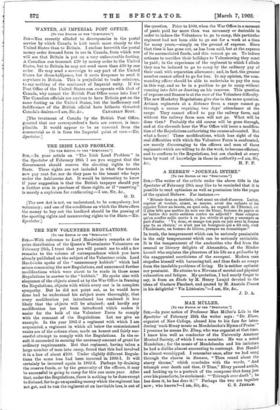A HEBREW "JOURNAL INTIME." [To THE EDITOR OF TEE "SPECTATOR."]
Sra,—The writer of the article under the above title in the Spectator of February 28th may like to be reminded that it is possible to read optimism as well as pessimism into the pages of the cynical Hebrew. For instance :— " R,eussir dims sa destinee, c'est aussi an chef-d'ceuvre. Lutter, esperer et vouloir, aimer, se marier, avoir des enfants et lea appeler Toter an besoin, en quoi cola, an regard de l'Eternel, est il plus bete quo mettre du noir sur du blanc, froisser du papier et se battre des units entieres centre un adjectif P Sans compter qu'on Bouffre mine morts hce jeu sterile et qu'on y escompte sa part d'enfer. Va done, et mange ton pain en joie avec In femme quo tu as ehoisie,' ce n'est pas un bourgeois qui a dit eels, c'eat rEeclesiaste, un homme de lettres, presque un romantique."
In truth, the temperament which can be seriously pessimistic is the only temperament which can be seriously optimistic.
It is the temperament of the anchorites who fled from the sensual or literary delights of Alexandria, of the Hindoo hermit who expiates the pleasures of his life as a grihastha by the exaggerated aseeticisms of the saunas/. Modern man
stupefies himself with harassing toil, and thus finds an escape from the insoluble problems of living. He is neither optimist nor pessimist. He attains to a Nirvana of mental and physical
exhaustion and fatigue. My quotation, I had nearly forgot to say, is from an Etude by M. Henry Laujol devoted to the
ideas of Gustave Flaubert, and quoted by M. Anatole France in his delightful "Vie Litteraire."—I am, Sir, &c., J. D. A.










































 Previous page
Previous page